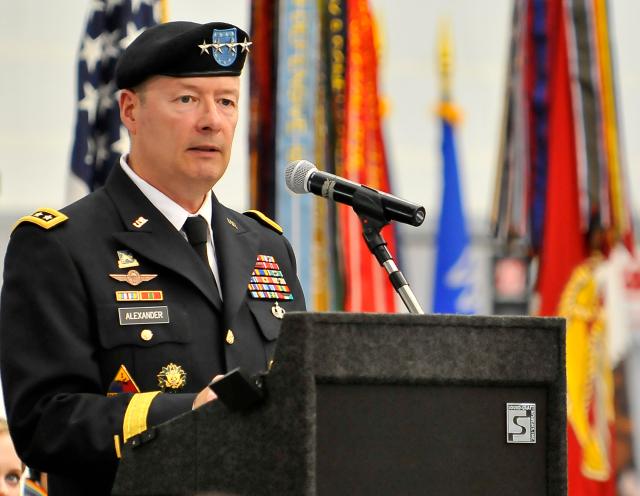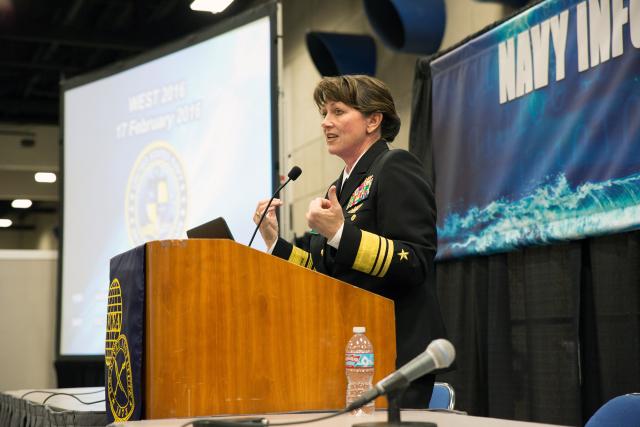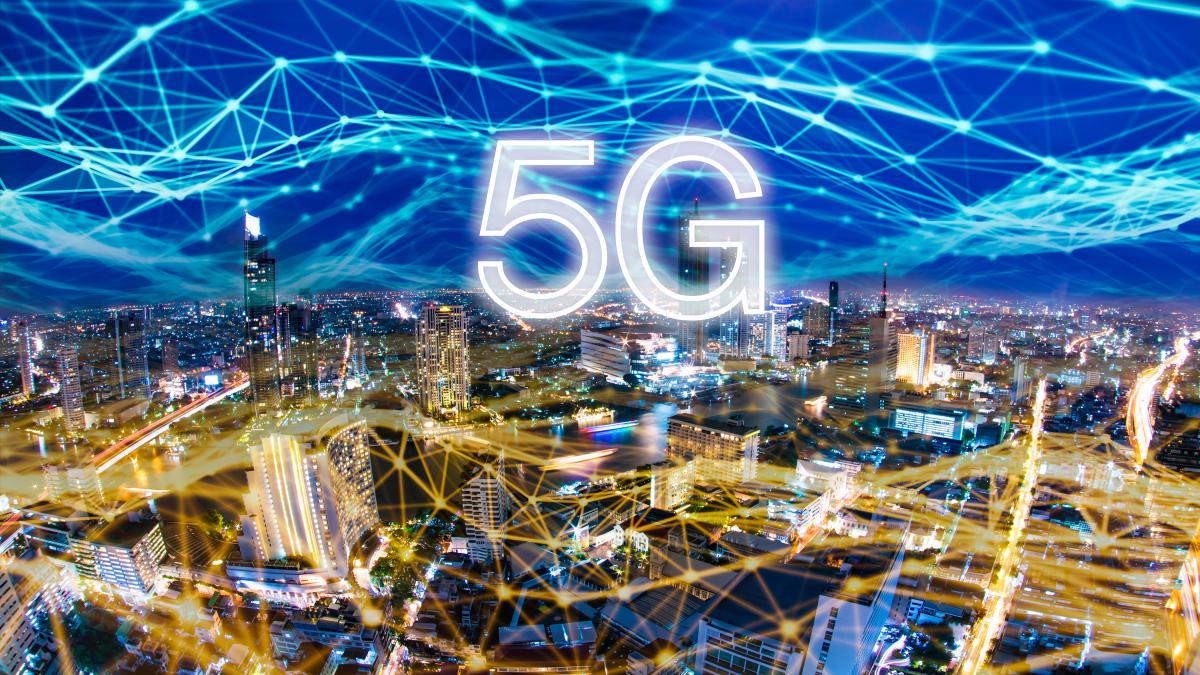This week, Proceedings interviewed General Keith Alexander, former Director of the National Security Agency and Commander, U.S. Cyber Command, and Vice Admiral Jan Tighe, former Commander, U.S. 10th Fleet/Fleet Cyber Command, about the challenges and opportunities coming with the transition to 5G cellular communications. Hear more from them during their public talk on 21 July in the ongoing Naval Postgraduate School’s “Secretary of the Navy Guest Lecture Series."
By General Keith Alexander, U.S. Army (Retired) and Vice Admiral Jan Tighe, U.S. Navy (Retired)
Proceedings: What are the key technology competitions the nation is facing today and why are they important?
General Alexander: There are several key economic competitions that are simultaneously occurring now: 5G, machine learning/artificial intelligence (ML/AI), nuclear-power generation, quantum computing, and biotechnology. We have fallen behind in most of these critical areas. Each is critical for our future economic success and raises core national security issues. Each of these areas will be critical to our future economic well being; and perhaps most important, all will have significant impacts on our national security and our military. As such, we should consider each of these as arenas of “Grand Economic Competition” and approach them with the combined power of our government, industry, and academic institutions.
Proceedings: What is 5G, how does it differ from 4G, and what are its military applications? Will it put any companies or industries out of business?
Vice Admiral Tighe: 5G is the next leap-ahead mobility architecture connecting people, machines, and sensors with much higher throughput, capacity, reliability and lower latency than 4G offers. Specifically, 5G enhanced mobile broadband is expected to be up to 100 times faster (10 gigabytes per second or GBPS) than 4G LTE. 5G will also support greater densities (10,000 times that of 4G) of massive machine-type communications, which are required for the growing number of Internet of Things (IOT) and the Industrial IOT. Finally, 5G ultra-reliable low latency communications (less than 1 millisecond latency) underpin mission critical services for autonomous vehicles, factory automation, and safety/security systems where communications delays are not an option. These key 5G features have the potential to disrupt companies and industries, while also unlocking trillions of dollars worth of global economic growth and creating tens of millions of jobs. While disruptive technologies can always lead to company collapse for those not agile enough to recognize and act upon the disruptive effects, I view these advances as all upside. As far as military applications go, we must position ourselves to take advantage of 5G in all the applications that commercial industries forge, but also in ways that we are uniquely equipped to implement, such as greater precision and lethality in warfighting.
General Alexander: I agree there is tremendous upside for companies and for nations. Like 4G, 5G will have a huge economic impact on those companies and nations that lead the way. Those that fall behind will have a tough time competing in future rounds. This is one of the fundamental reasons winning in 5G must be an “all of nation” approach.
Proceedings: Does China have an advantage in 5G technology? If yes, what is its advantage and what can we do about it?
General Alexander: China has a distinct advantage over the United States and our allies for several key reasons. First, China’s theft of U.S. and western intellectual property has allowed Chinese companies, such as Huawei and ZTE, to rapidly build and compete in the global marketplace. Second, the Chinese Government directly supports Huawei’s competition in this space for both economic and national purposes. That support allows Huawei to underbid western companies at prices that AT&T, Verizon and Ericson (for example) cannot match without government support.

General Alexander was the first commander of U.S. Cyber Command.
Vice Admiral Tighe: In addition, the Chinese have had significantly more influence with the 5G standards body (3GPP) than in 3G and 4G standards where the United States and European Union were the main drivers. Nevertheless, U.S. company Qualcomm has continued to participate in and collaborate on the 5G standard. Release 16 on 3 July 2020 had significant input contributed by Qualcomm for the 5G New Radio standard in the unlicensed spectrum. The United States needs to incentivize and accelerate 5G research and development, continue to collaborate with global stakeholders to build on the standard that delivers on the promise of 5G, particularly as we begin to conceptualize 6G.
Proceedings: What are some ways 5G will significantly change our day-to-day lives or day-to-day operations for the military?
General Alexander: There are a number of critical areas that 5G will impact our military. Obvious ones include the interconnection of battlespace devices and autonomous vehicles. 5G will be extremely important in battlespace visualization, knowledge sharing, speed of decision-making, and crowd sourcing. We will evolve our ability to defend in cyberspace much like we evolved air traffic control in the 20th century. With that defense will come a greater reliance on the public-private partnerships; private company cyber standards; and a resurgence of alliances like we had with NATO in the 20th century. Perhaps most important, 5G and the evolution of digital technology will have a significant impact, not only on warfare, but on the elements of power that nations use to coerce other nations to change behavior. We saw these changes as one of the main reasons for standing up U.S. Cyber Command in 2009. We will fight in cyberspace to defend our country. That battle has begun with the theft of intellectual property. We see Russia using cyber attacks to influence actions in eastern Europe; Iran using similar capabilities against the Gulf States; and China using that against all countries for IP theft, and regionally to influence outcomes on various issues like the South China Sea.
Proceedings: What are the cybersecurity implications? Are there any new precautions individuals, or organizations, should take as a result?
General Alexander: Our wealth, our personal information, our intellectual property, and our ability to defend our nation will increasingly depend on our digital infrastructure. China’s concept of future war against technologically advanced adversaries states that attacking a nation’s digital infrastructure is the first step in war. We are increasingly competing against China in a number of these economic areas. And we are pushing back on Chinese suppression in Hong Kong and their excessive territorial claims in the South China Sea. China’s theft of intellectual property has resulted in the greatest transfer of wealth in history. FBI Director Christopher Wray recently reported that Chinese economic espionage cases had increased by 1,300 percent over the past decade.
Vice Admiral Tighe: Clearly, there is a risk that global 5G infrastructure will be overwhelmingly underpinned by Chinese-provided technologies (namely Huawei and ZTE), which can then be used to support Chinese state-sponsored malicious cyber operations, including espionage, disruption of critical services and infrastructure, and (increasingly) influence operations. We need to assure global 5G connectivity to (at least) our closest allies with trusted 5G infrastructure and account for the fact that some of the global 5G infrastructure will be untrustworthy. We must continue to work with our allies to minimize the potential cyber risk posed by Chinese 5G infrastructure. Just this week, the British government reversed an earlier decision and decided not to allow Huawei to build U.K. 5G networks because of security concerns.

Vice Admiral Tighe speaking at the Naval Institute/AFCEA WEST Conference in San Diego in 2018.
With respect to new precautions, I expect security options to evolve over time with the roll out of 5G. For now the best security advice for individuals is not new, but has not been universally adopted: use a password manager, NEVER reuse passwords, turn on multi-factor authentication for your most sensitive interactions (banking and medical, for example), immediately patch or update your computer and mobile device operating systems when updates are published. Organizations must move beyond signature-based antivirus solutions to take advantage of artificial intelligence and machine learning algorithms in the cyber fight. Behavioral analytics are critical to breaking the cyber kill chain at machine speed. I also believe organizations must commit to the continuous learning and development of their cyber workforce. The threat landscape will continue to morph as new technologies are adopted, so the cyber workforce must be tooled and trained to prevent and mitigate these dynamically changing threats.
Proceedings: Some articles say 5G will greatly reduce data latency. How will that impact things like self-driving cars or unmanned vehicles in the military?
Vice Admiral Tighe: Reducing data latency is a critical element in control systems where multiple sensors feed into automated “decision-making” for systems like the self-driving car, the highly automated factory floor, military unmanned vehicles, and cyber defense. The more reliable and less latent the sensor data, the more autonomously the machines can operate, collaborate with each other, and complete human-intended missions or outcomes with less hands-on human intervention. Self-driving cars will be much safer than cars with humans at the wheel. Increasing the automation in factories will be more efficient and effective. 5G could also enable more computing power and collaboration (tipping & cueing) at the edge in military unmanned vehicles, which could make them more autonomous, more effective and/or more lethal, depending upon the mission.
General Alexander: The biggest shift will be in visualization, understanding, and AI/ML-led responses that can protect and defend in milliseconds. Humans simply cannot match those reaction speeds. This reduction in latency will be extremely important in autonomous vehicles employed by the military. Every major shift in weapons platforms has caused nations to rethink how they would fight. Cyber will have the greatest impact on warfare. For the Naval Postgraduate School, our service academies, academic institutions, and our military, we need to think about how we can leverage these new tools to defend our nation, our allies and our way of life.

No comments:
Post a Comment